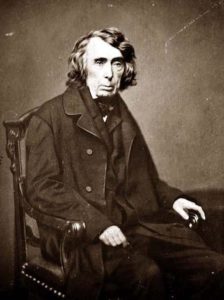
Roger B. Taney
*Roger Brooke Taney was born on this date in 1777. He was a white-American lawyer and judge who supported slavery.
Born in Calvert County, Maryland, Taney (pronounced Tony) came from a wealthy slave-owning family of tobacco farmers. He studied law in Annapolis and was in the same class as Francis Scott Key. He joined the House of Maryland Assembly in 1799 and became a prominent attorney by 1825. Two years later, Taney also became the Attorney General of Maryland. President Andrew Jackson appointed Taney Secretary of the Treasury in 1831. In 1836, he was appointed the Chief Justice of the United States Supreme Court.
He presided over abolitionist Thomas Garrett's trial in 1848 and the Dred Scott Case in 1857. Taney felt that the police power of a state entitled it to make reasonable regulatory laws even if they appeared to override provisions of the U.S. Constitution. He held that although Congress alone had the power to regulate interstate commerce, a state might exclude a corporation organized elsewhere. In sustaining fugitive slave laws, however, Taney denied Free states the power of refusing obedience to federal statutes requiring the surrender of escaped slaves.
His position on the slavery laws was most clearly expressed in the Dred Scott Case (1857). Here, he held that slaves (and even the free descendants of slaves) were not citizens and could not sue in the federal courts. He also believed that Congress could not forbid slavery in the territories of the United States. He died in 1864.
The Encyclopedia Britannica, Fifteenth Edition.
Copyright 1996 Encyclopedia Britannica Inc.
ISBN 0-85229-633-0